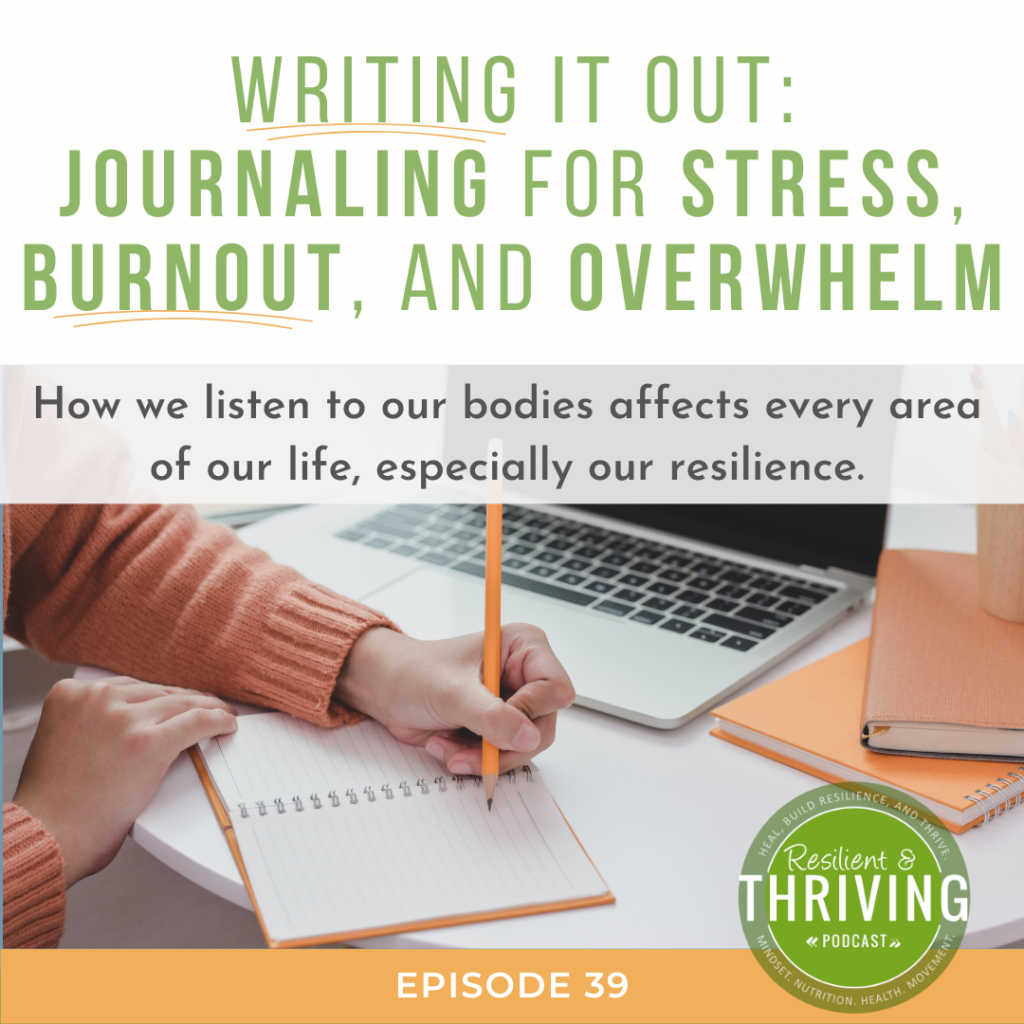Writing it Out: Journaling for Stress, Burnout, and Overwhelm—Episode 39

People who deal with a lot of stress understand the implications of it. You know what it does to your mental and emotional health, how it affects your physical health, and what the repercussions are. You are fully aware that it can lead to feeling overwhelmed and like you can’t handle your daily life, that it can lead to burnout and work issues, and cause problems with your relationships and personal life.
If this sounds like you, don’t just make it a daily habit where you go through cycles of extreme stress. Find a better way to manage & heal from it, something that is healthy and has other benefits, such as writing about your stress.
Here are some ways to write out your stress and worry to finally take control of your life and stop living in constant worry. And not only that, but to also increase your capacity to rewire your brain to look for the good!
Benefits of Journaling for Stress
Journaling is one of the best ways you can deal with stress. It provides so many benefits for you, from allowing you to do a brain dump (see below), to helping you understand where your stress is coming from. If you find out later that you have stress that comes in goes, going to previous journal entries in a stress journal helps you see what similarities there were, to figure out your main stress triggers.
And even more simply, it gives you a way to vent your worries and frustrations without worrying about burdening someone else with them.
Have a Brain Dump/Worry or Stress Journal
While you can journal in any type of journal you have, you might want a worry journal that is used specially for relieving your stress. This is something you will write in when you are dealing with a lot of stress or just trying to work through something. It helps to keep your thoughts organized, and makes it easier to go back and find a specific journal entry when you need to.
Try a Brain Dump
The brain dump provides a really easy way to get all those thoughts, worries, concerns, and idea out of your head and onto paper. Through this process, you really de-stress a lot, even coming up with worries you didn’t realize you had. It starts helping you find clarity in your thoughts and worries, and helps de-clutter your mind.
All you need to do for a brain dump is write whatever comes to mind on a piece of paper. This is often referred to as ‘stream of consciousness’ journaling, because you are just writing whatever comes to mind, without being concerned about organizing your thoughts. If your mind switches to a new subject, so does your journaling! Just keep writing until you feel like all the main thoughts are out on the paper.
Talk About Your Anxiety or Depression
You can also write about other mental health issues you are experiencing, such as how your depression or anxiety is affected. This is good to keep together with your anxiety or worry journal, since they are frequently connected.
If you have clinical depression, you know the depressive episodes will come and go. However, you might not realize the link between depression and stress or understand all your triggers until you start detailing the experience in your journal.
Track Your Different Triggers
Keeping track of triggers is one of the biggest benefits of journaling for stress, burnout, and overwhelm. You need to know why you are dealing with these experiences, not just when. The more detailed you are in each journal entry, the more you will start to see similar patterns. It might be the same time of week, before or after payday, related to people in your life or personal relationships, and many other things.
Write in the Journal Throughout the Day
When you are writing in a journal to help with stress and overwhelm, try to write during different times of the day. While morning or nighttime journaling is also really useful, for this purpose, you might need to have it available more often than other people using their journal.
If you have a stressful event in the middle of the day, you need to have that journal nearby so you can write about it, then go on with your day.
Have a Separate Victory and Peace Journal
You’ll want to have a separate journal that you write out victories, peace, celebrations, and hope in. In this journal, you’ll want to keep it around, whereas the other journal, you may want to toss and burn it when you’re all done with it. You want the freedom to release stuff in that journal fully.
You may receive insights and revelations after releasing your brain dumps, watching your triggers, or simply going throughout your day that you want to record and save.
It’s also incredibly beneficial for your brain and heart to be in a space of celebration, victory, and looking for ways you’re doing well.
As the saying goes: “what you focus on grows”, so how does this work when you’re releasing all this “stuff” via journaling?
You do it in a two-step form:
1. Release the emotion through journaling. Allow it to be released.
2. Journal intentionally about the wins, no matter how big or small. And focus on this.
As you do this, you’ll begin to train your brain, your neural networks, to be able to freely process what’s “clogging the system” and to look for ways things are actually going well.
Interested in learning tools like this to overcome stress, past wounds, fatigue, and overwhelm? Sign up for a FREE Consultation here.

Hi there! My name is Kirsten Larsen, also known as Coack K. I’m a holistic health coach, Clinical EFT practitioner, and running coach. My journey has been a long one in the way of healing my body, emotional healing, trauma healing, transformational mindset techniques, emotional freedom technique, learning nutrition, injury prevention, running form and technique, and more. All in all, what I’ve found is that we are designed to thrive in our body, soul, and spirit. If we are not, then there is simply an element we’re missing. It’s been my passion and joy to help people remove the blocks that keep them from thriving in their body and mind, so that they can thrive in life. If you’re interested in coaching, sign up for a free consultation call here.


